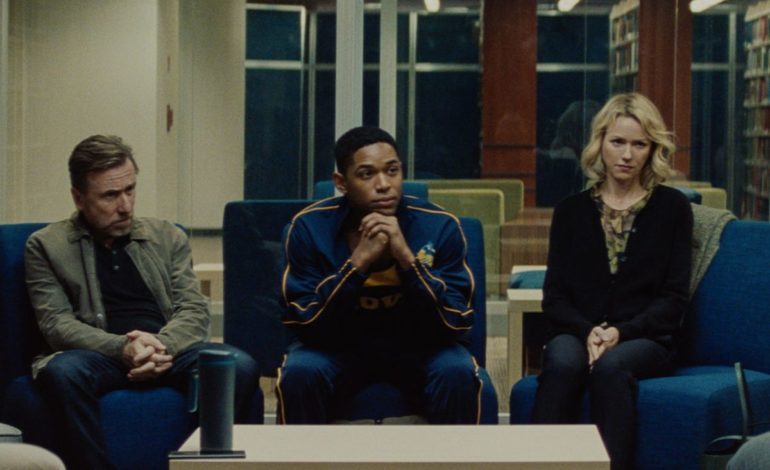

Luce is a new drama from director Julius Onah (The Cloverfield Paradox), and is based on a 2013 play from J.C. Lee, who co-wrote the screenplay alongside Onah. This story revolves around Luce Edgar (Kelvin Harrison Jr.), an athletic high school valedictorian who was adopted from war-torn Eritrea by white, upper-middle class, suburban parents Amy (Naomi Watts) and Peter (Tim Roth). When Luce’s teacher Harriet Wilson (Octavia Spencer) brings some alarming accusations to his parents’ attention, they begin to question if their son is truly who they think he is. Going into Luce, I didn’t know much about this film outside of its cast and basic premise, yet this lack of knowledge made my viewing all the better. Luce pleasantly surprised me in how it tackled relevant socio-political issues that relate to race and economic position.


One of my few issues with Luce is the lack of a distinct identity Onah gives to his competent direction. Better cinematic adaptations of plays have taken advantage of the medium’s visual possibilities, such as how Alfred Hitchcock shot Rope as if it took place in a single take and Barry Jenkins meticulously frameing Moonlight with a beautiful neon color palette. Most of the filmmaking in Luce, on the other hand, emphasizes shot/reverse shot sequences with a stronger emphasis on the performances. Some moviegoers might not mind nor recognize this approach as it happens and these scenes indicate that Onah should direct more small-scale dramas over large-scale blockbusters. However, I really think the material on display would have benefitted from a more experienced filmmaker.
Thankfully, Luce delivers on some impressive A-list performances. Kelvin Harrison Jr. was terrific in the 2017 horror film It Comes at Night and proves equally compelling in the title role of Luce. He is so likable and charismatic that I cannot help but root for him even when the accusations against him sound legitimate. Luce obviously wants to be his own person but has difficulty doing so as his school’s poster child. Hopefully, Hollywood will give Harrison Jr. the recognition he deserves in future movie appearances.
The movie’s supporting cast shines as well. Naomi Watts and Tim Roth are great as Luce’s adoptive parents, both of whom struggle to believe that their supposedly perfect son may not be so perfect after all. Octavia Spencer also proves compelling as Luce’s suspicious, yet caring teacher Harriet, who attempts to use Luce as a symbol to inspire his classmates, despite his belief that she’s not letting him be himself. I like how the movie showcases Harriet’s tumultuous relationship with her mentally ill sister Rosemary (Marsha Stephanie Blake), to make her appear more sympathetic and not a one-dimensional antagonist. Everyone goes all in with their performances in this film and I hope the lead actors receive some amount of Academy consideration for their work here.


Luce wouldn’t be quite as effective without the incredibly well-written screenplay by Lee and Onah linking its narrative moments together. The fact that it raises timely and significant questions about identity and social status is enough to justify the price of admission. If other movies have already covered this story, then Luce covers it for today’s audiences. The film also leaves viewers with enough ambiguity to make them think about what they just saw long after they have left the theater. At a 109-minute runtime, the film can sometimes drag but it becomes more and more engaging as the drama heats up.
Verdict: 4 out of 5
Despite its flaws, Luce is definitely worth seeing in theaters. The great performances and relevant screenplay more than make come for the okay direction and, in my opinion, it couldn’t have been released at a more relevant time.
